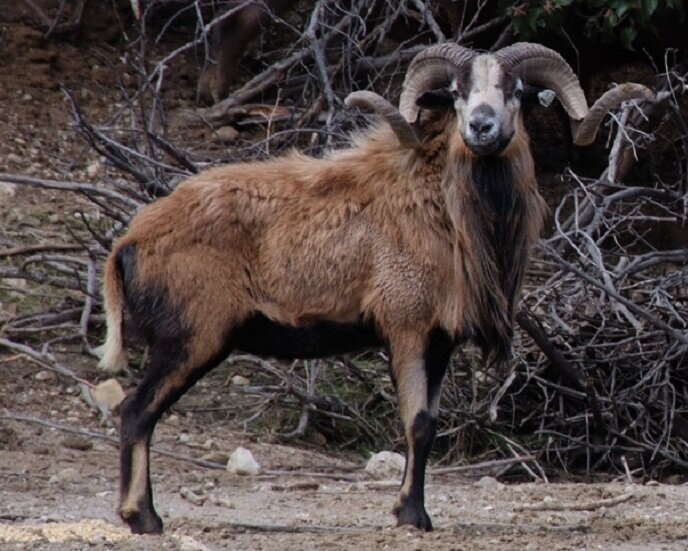
Corsican sheep, also known as the Corsican Ram, is a breed of domestic sheep originating from Corsica, an island in the Mediterranean Sea. They are known for their unique appearance, with large horns and a distinctive dark, dense wool coat. Corsican sheep are also highly valued for their flavorful and tender meat. They are raised mainly for meat production, but they can also be used for wool production and as ornamental animals. They are known to be hardy and adaptable, able to survive in a variety of climates and terrains, making them a popular choice among farmers and ranchers.
Basic Care
Caring for Corsican sheep requires proper housing, nutrition, health management, and maintenance of their distinctive horns. Here are some general guidelines for caring for Corsican sheep:
Housing
Corsican sheep should have access to shelter from the elements, such as a barn or shed, and a fenced area for grazing. They need enough space to move around comfortably, and the housing should be clean, dry, and well-ventilated.
Health Management
Regular check-ups with a veterinarian, parasite control, and annual vaccinations are important to keep Corsican sheep healthy. It is also important to be aware of common health problems, such as foot rot, and to take steps to prevent them.
Horn Care
Corsican sheep have large horns that can make it difficult for them to move around and eat. It may be necessary to remove or trim the horns if they are causing problems. This should only be done by a trained professional.
Management of the Coat
Corsican sheep have a dense, dark wool coat that needs to be trimmed periodically to keep them comfortable and healthy. Regular shearing is also important for wool production.
These are general guidelines for caring for Corsican sheep, and specific requirements may vary depending on your climate, location, and other factors. It is important to consult with a veterinarian or an experienced sheep farmer to ensure that your Corsican sheep receive the best care possible.
Basic Nutrition
Forage
The primary source of nutrition for Corsican sheep should be high-quality forage, such as grass, legumes, and hay. Fresh pasture should be available during the growing season, and hay should be fed during the winter months or when pasture is not available.
Grain
Corsican sheep may also benefit from a supplement of grain, such as corn or oats. The amount of grain fed should be adjusted based on the sheep’s age, weight, and overall health.
Minerals
Corsican sheep need a balanced mineral supplement to ensure that they get the necessary vitamins and minerals to maintain good health. A commercial sheep mineral mix can be provided in a feeder, or loose minerals can be added to the grain or forage.
Salt
Corsican sheep also need access to salt to help regulate their fluid balance and maintain proper nerve and muscle function. A salt block or loose salt can be provided in a feeder.
Water
Clean, fresh water should be always available. The water source should be cleaned and refilled regularly to prevent contamination.
Vaccinations
Vaccination is an important part of a health management program for Corsican sheep, and it helps to prevent the spread of disease and to keep the flock healthy. Here are some common vaccinations for Corsican sheep:
Clostridial Diseases
Corsican sheep should be vaccinated against clostridial diseases, such as tetanus, enterotoxemia, and blackleg, which can cause serious illness and death.
Caseous Lymphadenitis (CLA)
Corsican sheep may also be vaccinated against caseous lymphadenitis (CLA), a bacterial infection that can cause abscesses in the lymph nodes.
Enteric Diseases
Vaccination against enteric diseases, such as scours, may also be recommended to protect against gastrointestinal problems.
Footrot
This is a common problem in sheep, and vaccination can help to prevent the spread of this infectious disease.
Other Diseases
Depending on your location and the disease risk in your area, other vaccines, such as those for pneumonia, may also be recommended.
It is important to consult with a veterinarian to determine the best vaccination program for your Corsican sheep. The timing and frequency of vaccinations will depend on several factors, including your location, the local disease risk, and the age and overall health of your flock.
5 Fun Facts About Corsican Sheep
Unique Horns
Corsican sheep are known for their large, distinctive horns. Both male and female sheep have horns, and the horns can grow up to 30 inches in length in some cases.
Dense Coat
Corsican sheep have a dense, dark wool coat that is prized for its insulating properties. The wool is also highly valued for its softness and shine.
Meat Quality
Corsican sheep are raised mainly for meat production, and their meat is flavorful and tender. The meat is often used in traditional dishes on the island of Corsica.
Adaptability
Corsican sheep are known for their hardiness and adaptability. They are able to thrive in a variety of climates and terrains and are able to survive on sparse vegetation in difficult environments.
Heritage Breed
Corsican sheep are considered a heritage breed, and they are an important part of Corsica’s cultural and agricultural history. The breed is protected by law on the island, and there are efforts underway to conserve and promote the breed. If you want to get a good laugh about amateurs dealing with sheep, read this article on a college students late night encounter with a large Merino Ram.
Related Articles & Free Email Newsletter Sign Up
10 Tips to Raise Healthier and More Profitable Sheep




Comment here